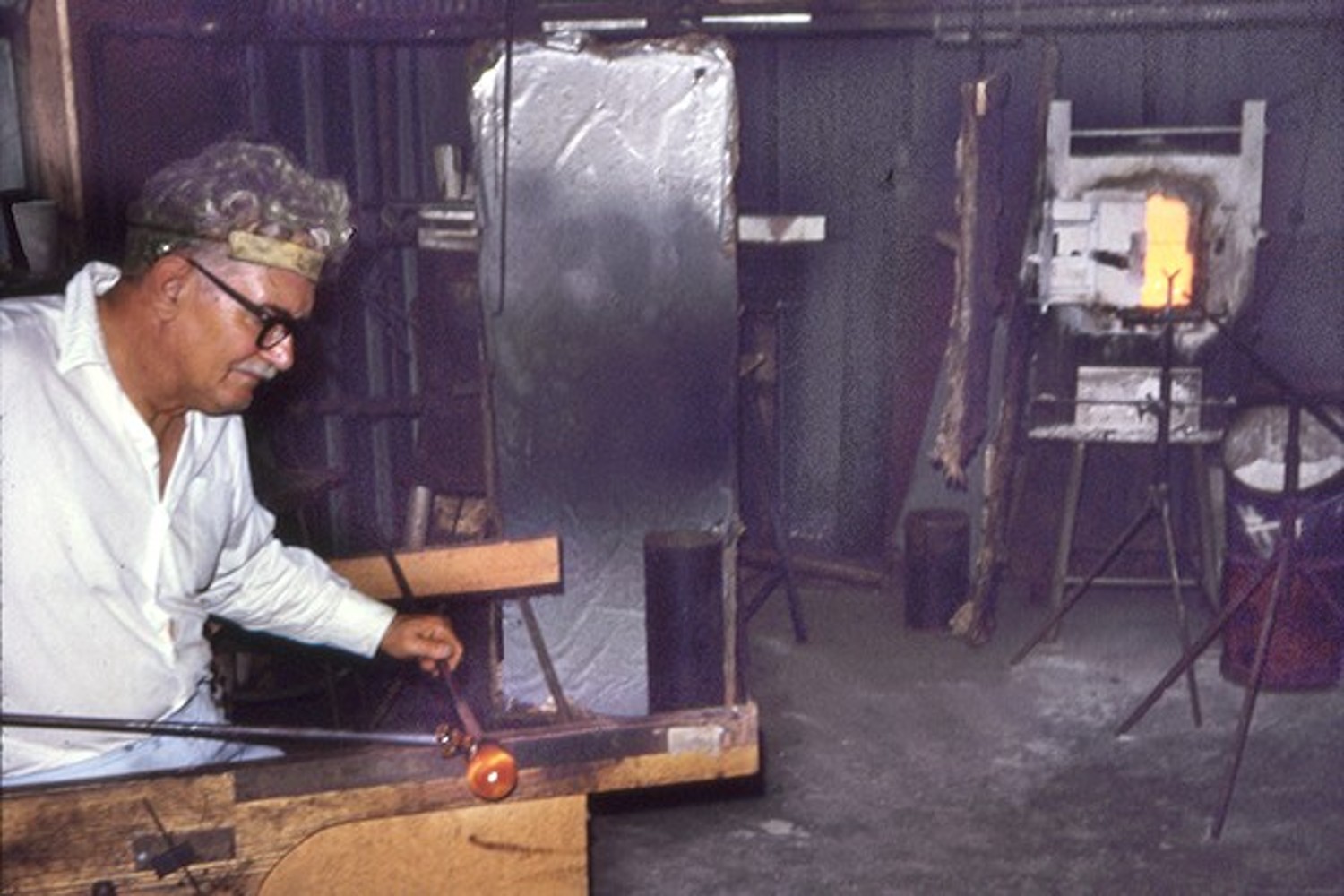 CLARION CO., Pa. (EYT) – Dominick Labino–a talented researcher and inventor who held sixty patents in the U.S. and hundreds in foreign countries–is proof positive that Clarion County nurtures its residents for future success.
CLARION CO., Pa. (EYT) – Dominick Labino–a talented researcher and inventor who held sixty patents in the U.S. and hundreds in foreign countries–is proof positive that Clarion County nurtures its residents for future success.
(Pictured above: Dominick Labino working with glass at his workshop.)
Labino was born on December 4, 1910, in Fairmount City, and by the time of his death in 1987, he was an internationally-known scientist, inventor, artist, and master craftsman in glass. Labino’s artworks in glass are in the permanent collections of more than 100 museums throughout the world. Labino held over 60 glass-oriented patents in the United States, including the Clarion County Historical Society’s Sutton-Ditz Museum.
“We have an incredible collection of art glass that he handpicked for us,” said Historical Society Executive Director Mary Lee Lucas.
Clarion County Historical Series is brought to you by First United National Bank – The FUN Bank!
Immigrants from the Turano area in Italy, Labino’s parents moved to Clarion County. His father mined coal, and his mother was said to be a skilled weaver and also raised three children. They saved money and bought a grocery store and a farm.
Labino was trained as an engineer at the Carnegie Institute of Technology, was an instrument maker for the Bacharach Instrument Company in Pittsburgh, and began his professional career at Owens-Illinois, Inc., in Clarion which fueled his lifelong passion for working with glass.
When he was in charge at the Owens-Illinois milk-bottle plant, he set up small laboratories to formulate new glass batches and fabricate small glass objects. In the 1940s, Labino’s predecessor, Ben Alderson, taught him how to blow glass.
Labino continued his career in the glass industry and joined Glass Fibers, Inc., which subsequently became L.O.F. Glass Fibers, and held the positions of Vice President and Director of Research. The company then became Johns-Manville Fiber Glass, where he served as Vice-President and Director of Research and Development until his retirement in 1965, but he remained affiliated as a research consultant.
He studied and wrote about ancient glass-making methods. In the 1950s, he moved to the countryside and built a 6,000-square-foot workshop where he worked all day and into the night, making furnaces and tools, and creating beautiful enamel jewelry, handsome paintings, and mostly, stunning glass art, always insisting he was not an artist but a craftsman.
“You can do more things with glass than any other medium. There are absolutely no limits as to what you can do in the way of color with glass,” he said.
In 1962 at the Toledo Museum of Art, Labino displayed revolutionary equipment and techniques to nine potters on how they may make art glass–which required a lower temperature and smaller scale–in their home studios as they might (use) clay or silver, or bronze. He later designed a more efficient studio kiln that was used across the country.
Labino also invented pure silica fiber which was used in insulating tiles covering the space shuttle Columbia and the Apollo, Mercury, and Gemini spacecraft. As a glass artist, Labino was co-founder of the studio glass movement in America. His artworks are in over 60 museums in the U.S. and abroad, and his architectural elements of hot-cast panels are in many public buildings. His forte was the original formulation of a glass of high quality, durability, and unusual color effects.
Not bad for someone who started in Clarion County.
Clarion County Historical Series is brought to you by First United National Bank – The FUN Bank!
Stop at one of their offices in Fryburg, Clarion, New Bethlehem, Oil City, Franklin, or Cranberry and allow First United National Bank make you one of their satisfied customers. For more information visit Fun-Bank.com.
Copyright © 2024 EYT Media Group, Inc. All rights reserved. Any copying, redistribution or retransmission of the contents of this service without the express written consent of EYT Media Group, Inc. is expressly prohibited.








